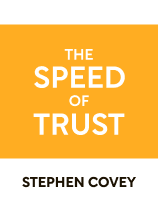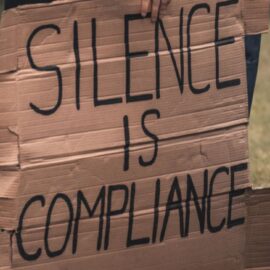

This article is an excerpt from the Shortform book guide to "The Speed of Trust" by Stephen M. R. Covey. Shortform has the world's best summaries and analyses of books you should be reading.
Like this article? Sign up for a free trial here .
What happens when you lose trust in a relationship? How should you repair trust in a relationship when it’s lost?
Author Stephen Covey says trust is your most valuable currency in a relationship. However, in society, Covey notes that high-trust relationships are still undervalued. To repair trust in a relationship when it’s broken, Covey believes forgiveness and demonstrating authenticity are two of the most important factors.
Keep reading to learn Covey’s advice for repairing trust in a relationship the right way.
What to Do When Trust Is Lost
If you’re a trustworthy person, you consistently demonstrate your values, and people notice. This consistency builds trust because people know what to expect from you. On the other hand, Covey notes that disrupting this consistency with a violation of your nature (stealing, lying, cheating, and so on) is the fastest way to lose someone’s trust.
| Forgiving Breaches of Trust As Covey explains, your nature (he calls it character) is intrinsic. Therefore, it should be constant despite changing circumstances. This could help explain why people tend to forgive breaches of trust involving competence more readily than breaches of trust involving character. People can change their competence with practice or by learning new skills. Their character, on the other hand, is more difficult to change. Therefore, if someone violates your trust with a transgression of character, it is reasonable to assume that they’ll do it again, and you might decide not to trust them. For example, say you are working with a fitness trainer you selected because of her empathy. One day she mistakenly chooses an exercise that reaggravates an old injury of yours, and she feels bad. You forgive her breach of competence because she has been a great trainer, and you know she cares about you. On the other hand, say one day you tell her a particular movement hurts, and she rolls her eyes and calls you a wimp. Her lack of empathy at that moment makes you question her empathy and her nature, and you might feel uncomfortable working with her again. |
Repair Trust in a Relationship With Authenticity
To repair trust in a relationship, you should strive for an authentic communication style. Covey explains that people should come away from conversations with you with the right impression of your intentions and motivations. He notes that people are good at spotting inauthentic communication, for example, spinning or telling only parts of the truth. Unfortunately, these tactics waste time, and you pay a hefty trust tax on all future communication when people don’t see you as authentic.
| Little Fibs Diminish Trust The evolutionary drive for self-preservation makes us attuned to inconsistencies between what people say and what they do. When people don’t mean what they say or don’t do what they say they will, we learn to trust what they say less. Over time, even seemingly inconsequential fibs, inconsistencies, or omissions can diminish trust. For example, say you tell your friend you’ll pick her up at 8:00 but don’t show up until 8:20. If this happens once, your friend might simply be more attuned to your timing the next time. If it happens repeatedly, your friend will likely start mentally adding 20 minutes to any meet-up time you set because she doesn’t trust that you will be there when you say you will. If this causes strain in your relationship, your small timing inconsistencies could result in a significant trust tax. |
Covey notes that being willing to address taboo or unpleasant topics with open and authentic communication helps to repair trust in a relationship. Additionally, since emotionally charged or uncomfortable situations can negatively impact interpersonal interactions and productivity, addressing them within your family or organization can result in major trust dividends.
(Shortform note: Part of maintaining an authentic communication style involves leaving space for emotion in emotional conversations. Conversations about difficult or emotional issues are likely to make participants emotional. But stifling or ignoring these emotions for the sake of objectivity makes these conversations less authentic and potentially less productive.)
Transparency is another way individuals can show authenticity and repair trust in a relationship. For example, a company could lay out its pay structure and promotion track to give its employees a clear sense of what they can expect from their careers. Covey explains that the more details you share, the more you reduce unknowns, and the easier it becomes to trust you.
(Shortform note: Other experts add that transparency can be a great way to build trust when you aren’t sure where else to start. Transparency projects openness and honesty and can make you seem more approachable. For leaders, transparency is a great way to earn respect, start building trust, and create an open and team-oriented culture in an organization. As Covey notes, simply being transparent about wanting to build trust in an organization can be a great way for a new leader to begin building or repairing trust in relationships.)
| Apologies That Promote Trust Apologizing for mistakes can help repair trust in a relationship, but not all apologies are equally effective. Research from two studies of over 700 participants suggests six aspects of an effective apology: showing regret, offering an explanation, taking responsibility, showing remorse, sharing a plan to fix the issue, and asking for forgiveness. The results of the study on apologies align with Covey’s discussion of building trust. Of the six elements of an apology, taking responsibility—which we can think of as showing humility—and sharing a plan to fix the issue—which we can think of as demonstrating our ability—were the two most important elements of an effective apology. |

———End of Preview———
Like what you just read? Read the rest of the world's best book summary and analysis of Stephen M. R. Covey's "The Speed of Trust" at Shortform .
Here's what you'll find in our full The Speed of Trust summary :
- Why trust is the ultimate key to success
- A roadmap for building and leveraging trust
- An explanation of Steven Covey's “four cores of credibility”






